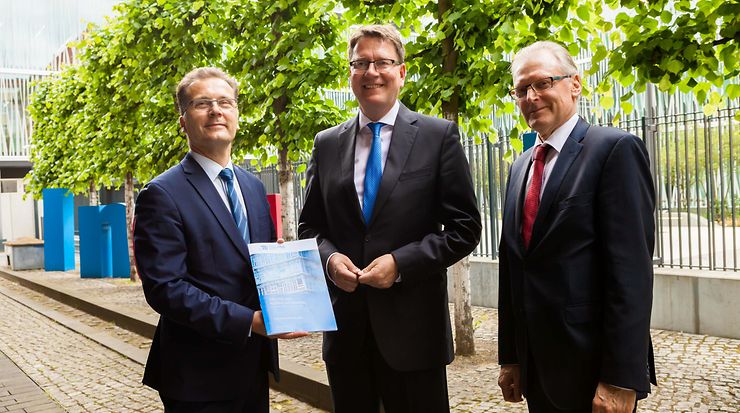Press
More influence on standards than on laws

© BMWi, Anja Blumentritt
Findings of the 2019 German standardization panel presented – some 900 companies participating
According to companies' own estimation, the standardization process, with the opportunity to develop the associated standards, is a more viable channel than legislation for companies wishing to input their technological know-how. This is one of the key results of the seventh “German standardization panel”. What is more, the companies questioned rated national standardization higher than both European standardization and national and EU legislation when it comes to transparency, openness, neutrality, effectiveness, efficiency and coherence. For DIN, the positive results confirm the standardization process and the valuable work carried out by the 34,500 experts from industry, research, consumer protection and the public sector who contribute their knowledge to the development of standards and specifications.
Each year, the Department of Innovation Economics at the Technical University Berlin (TU Berlin) carries out a survey on standardization. Some 900 companies took part in the latest study, 80 percent of which are based in Germany. On 28 May, the team headed by Professor Knut Blind presented the results to the German Federal Ministry for Economic Affairs and Energy (BMWi), which took over patronage of the panel in 2017.
Standardization as a strategic instrument
More than three quarters of the participants consider it “very important” or “extremely important” to conform to national standards cited in laws, and also to harmonized European Standards. Harmonized standards are European Standards that are developed following a request by the European Commission and which give detail to the essential requirements set out in European directives. Almost half of the companies view their implementation as being absolutely essential. At the national level, laws and standards are closely intertwined: Laws mainly set out the basic framework, while standards provide the technical details. Experts from the relevant fields take on the job of developing and formulating the standards.
“The German standardization panel is a very helpful way of identifying the effect standardization has on the success of companies and organizations by examining how they interact,” says Knut Blind, Head of Innovation Economics at the Faculty of Economics and Management of the Technical University Berlin (TU Berlin). "The panel indicates to us where the standardization process can still be optimized. It is also a good way of getting the message over to other companies that standards and specifications are important strategic tools that can be used for launching new products on the market,” stresses Dr. Michael Stephan, the member of DIN’s Management Board heading the Standardization Division. For Germany, investing in standardization is well worth the effort: The 2011 Study "The Economic Benefits of Standardization" puts the annual benefit to the economy at 16,77 billion euros. Not to mention the contribution of standards towards making products and the workplace safer and protecting the environment.
Important findings for research
Since 2012, some 1,000 companies have taken part in the German standardization panel every year. Up to the present day, information from 4,000 different companies has been gathered, more than half of which are DAX index listed, but also including many SMEs. Each study focusses on a specific aspect. The team from the Innovation Economics department at the TU Berlin devise the online surveys and evaluate the data collected. This is then used, for example, to identify new scientific insights pertaining to standardization. The results of the survey can be compared with DIN’s own data to arrive at results that are representative for the companies engaged in standardization. The study carried out from October 2018 to January 2019 concentrated on the issue of standards in public law. The German standardization panel is supported by DIN and DKE. The latest results are available here.